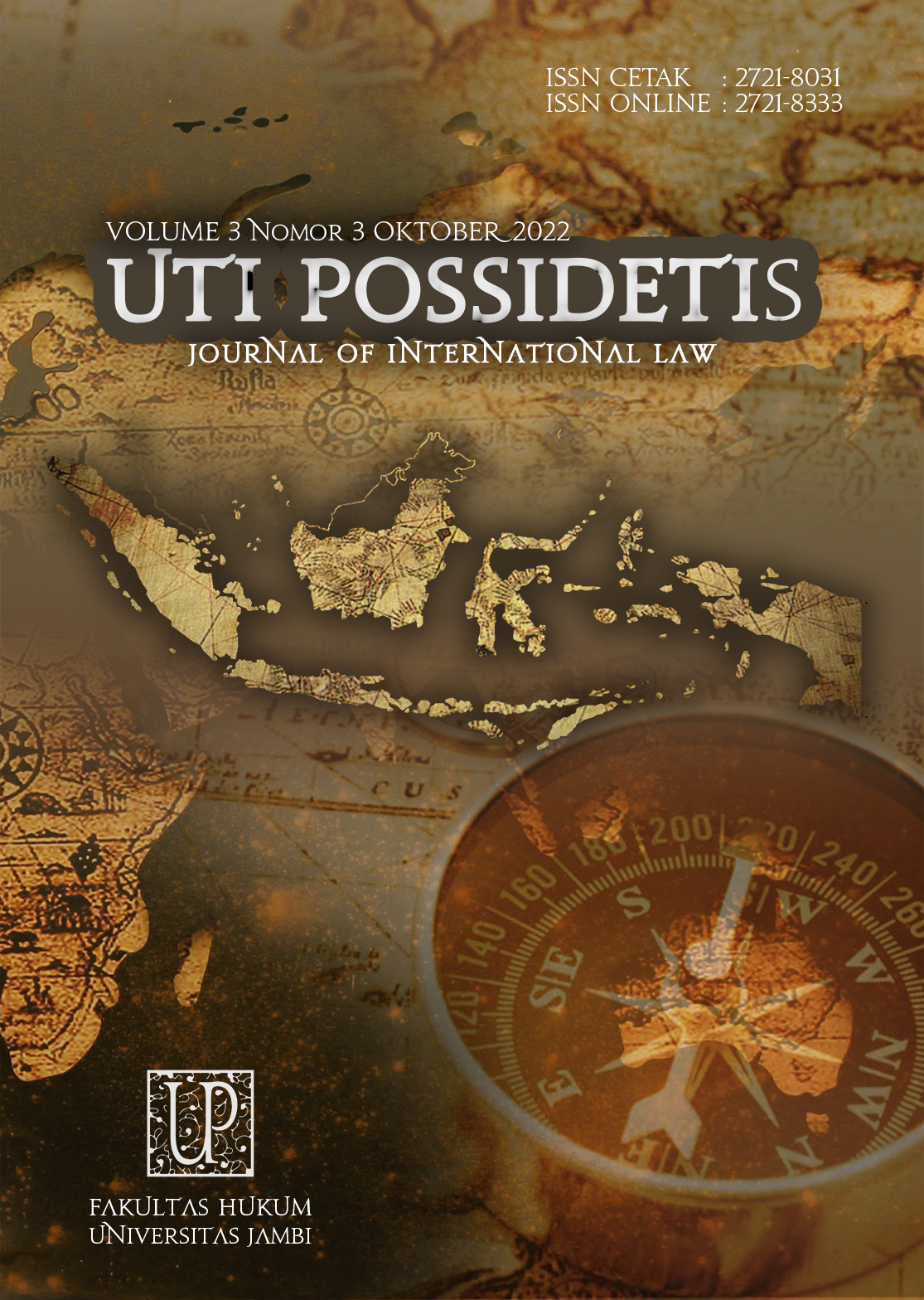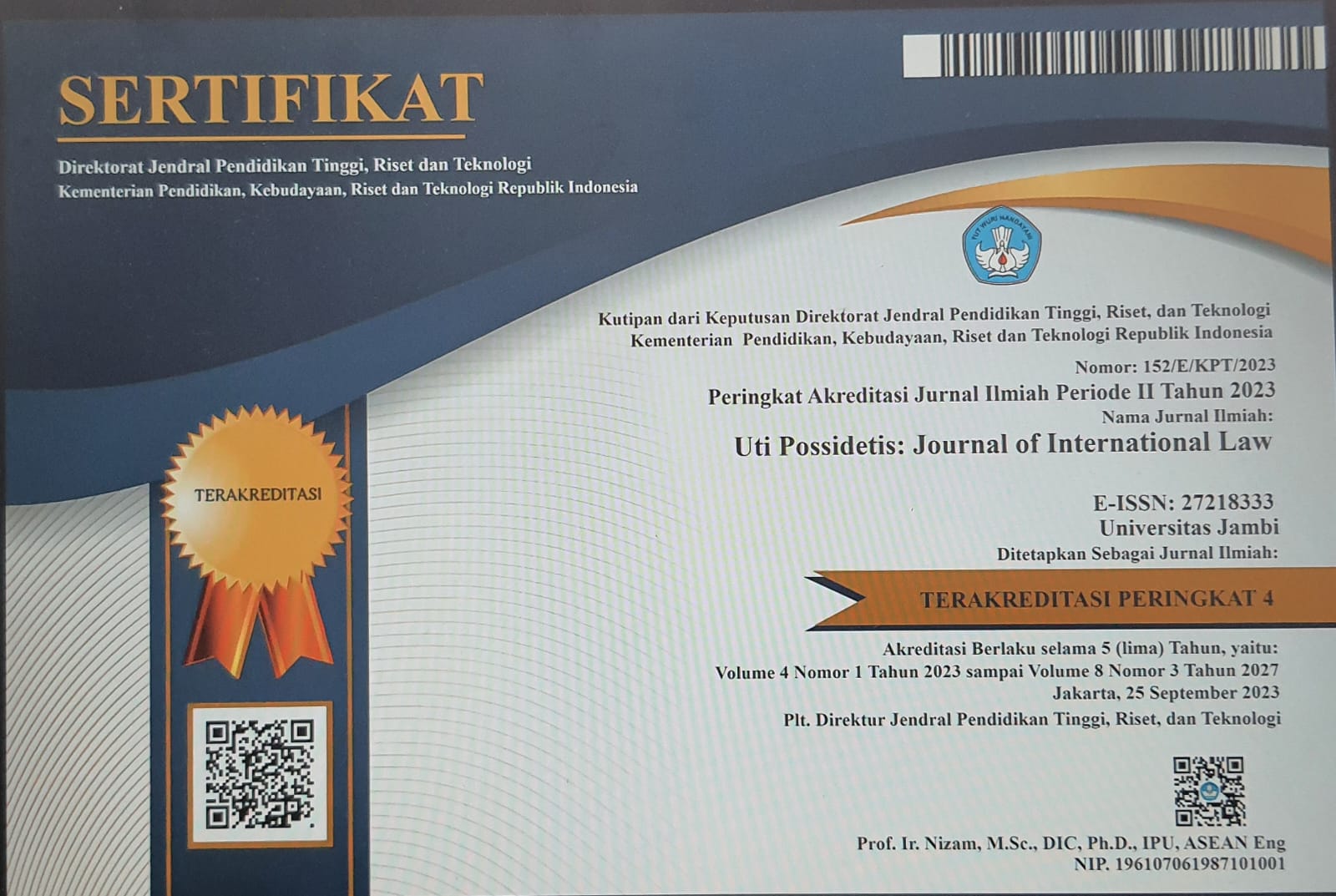Perjanjian Investasi Bilateral: Self-Judging Sebagai Solusi?
DOI:
https://doi.org/10.22437/up.v3i3.19436Keywords:
national security, bilateral investment treaty, security exceptionAbstract
This article was prepared to formulate a strategy for formulating the drafting of exclusion clauses in bilateral investment treaties and legal policies that are in accordance with national security without violating international law. In its preparation, doctrinal legal research with legal objects is used which is conceptualized as a statutory rule based on the doctrine of positivism (normative juridical) schools. In the Discussion, it was found that Host Country has several options in implementing policies that put forward the national interest such as, asserting rights in agreements in good faith, including exceptions expressly, establishing definitions appropriately in agreements, mentioning special clause categories in agreements, conducting evaluations in a reasonable manner and self-judging. However, of the seven options already mentioned, self-judging is the most profitable option for host countries in implementing policies that orientate national interests. The self-judging clause is the choice of host country for two reasons. First, the clause gives the state discretion to unilaterally opt-out of international obligations and secondly, the evaluation of the elements for opt-out is not set out completely objectively from an external point of view, but only from the point of view of the state concerned.
Downloads
References
Akande, Dapo dan Sape Williams. International Adjudication on National Security Issues: What Role for the WTO. Virginia Journal of International Law. Vol. 43. 2002.
ASEAN – Japan Comprehensive Economic Partnership. Ditandatangan 14 April 2008, berlaku 1 December 2008.
Bernasconi-Osterwalder, N, S. Brewin, dan N. Maina. Protecting against Investor–State Claims Amidst COVID 19: A Call to Action for Governments. IISD Commentary. https://www.iisd.org/sites/default/files/publications/investor-state-claims-covid-19.pdf. Diakses 11 Oktober 2021.
BIT Belgian-Luxembourg Economic Union (BLEU) – China 2005.
BIT Hungaria – India (2003),
Brew, Robert. Exception Clauses in International Investment Agreements as a Tool for Appropriately Balancing the Right to Regulate with Investment Protection. Canterbury Law Review. Vol. 25. 2019.
Bücheler, G. Proportionality in Investor-State Arbitration. Oxford: Oxford University Press. 2015.
Burke-White, William W. dan Andreas von Staden. Investment Protection in Extraordinary Times: The Interpretation and Application of Non-Precluded Measures Provisions in Bilateral Investment Treaties. Virginia Journal of International Law. Vol. 48. 2008.
Canada Model FIPA 2021.
CMS Gas Transmission Company v Argentina. ICSID case no. ARB/01/08. Award. 12 Mei 2005.
Continental Casualty Company v. Argentina. ICSID Case No. ARB/03/9. Award. 5 September 2008.
Crampin, Joseph. Book Review of Good Faith in International Investment Arbitration written by Emily Sipiorski. The Journal of World Investment and Trade. Vol. 20 No. 6. 2019.
Framework Agreement on the ASEAN Investment Area 1998.
Fry, James D dan Odysseas G. Repousis. Towards a New World for Investor -State Arbitration through Transparency. New York University Journal of International Law and Politics. Vol. 48. No. 3. 2016.
Hamzah. Bilateral Invetsment Treaties (BITs) in Indonesia: A Paradigm Shift, Issues and Challenges. Journal of Legal, Ethical and Regulatory Issues. Vol. 21. 2019.
India – Korea Comprehensive Economic Partnership Agreement 2009.
India – Singapura Free Trade Agreement 2005.
Jepang – Filipina Economic Partnership Agreement 2006
Kabra, Ridhi. Return of the Inconsistent Application of the Essential Security Interest Clause in Investment Treaty Arbitration: CC/Devas v India and Deutsche Telekom v India. ICSID Review – Foreign Investment Law Journal. Vol. 34. 2019.
Kalkhoran, Mir Hossein Abedian dan Habib Sabzevar. Standards of Review for the Non Precluded Measures Clause in Investment Treaties: Different Wording, Different Levels of Scrutiny. Netherlands International Law Review. 2021.
Kingsbury, Benedict dan Stephen Schill. Public Law Concepts to Balance Investors’ Rights with State Regulatory Actions in the Public Interest—The Concept of Proportionality. Dalam Stephen Schill dan James Crawford J (eds). International Investment Law and Comparative Public Law. Oxford: Oxford University Press. 2010.
Kingsbury, Benedict, Nico Krisch, dan Richard B. Stewart. The Emergence of Global Administrative Law. Law and Contemporary Problems. Vol. 68. 2005.
Kolb, R. Principles as Sources of International Law (with Special Reference to Good Faith). Netherlands International Law Review. Vol. 53. 2006.
Korzun, Vera. The Right to Regulate in Investor-State Arbitration: Slicing and Dicing Regulatory Carve-Outs. Vanderbilt Journal of Transnational Law. Vol. 50. 2018.
Lester, Simon, Bryan Mercurio, dan Arwel Davies. World Trade Law: Text, Material and Commentary. Edisi 2. Oxford: Hart Publishing. 2012.
LG&E Energy Corporation v. Argentina. ICSID Case No. ARB/02/1. Decision on Liability. 3 October 2006.
McLaughlin, Mark. State-Owned Enterprises and Threats to National Security under Investment Treaties. Chinese Journal of International Law. Vol. 19. 2020.
Model BIT Azerbaijan 2016.
Model BIT Belgium-Luxembourg Economic Union 2015.
Model BIT Ceko 2016.
Model BIT Italy 2021.
Model BIT Kanada 2021.
Neumann, J dan E Tuer. Necessity Revisited: Proportionality in World Trade Organization Law after Korea Beef, EC Asbestos, and EC Sardines. Journal of World Trade. Vol. 37. No. 1. 2003.
Nolan, Michael. Challenge to the Credibility of the Investor State Arbitration System. American University Business Law Review. Vol. 5. No. 1. 2015.
OECD Guidelines for Recipient Country Investment Policies Relating to National Security.
Patel, Nikesh. An Emerging Trend in International Trade: A shift to Safeguard against ISDS Abuses and Protect Host State Sovereignty. Minnesota Journal of International Law. Vol. 26. 2017.
Ranjan, Prabhash. Non-Precluded Measures in Indian International Investment Agreements and India’s Regulatory Power as a Host Nation. Asian Journal of International Law. Vol. 2. 2012.
Reinisch, August. Necessity in International Investment Arbitration – An Unnecessary Split of Opinions in Recent ICSID Cases? Comments on CMS v. Argentina and LG&E v. Argentina. The Journal of Investment & Trade. Vol. 8. 2007.
Rose-Ackermann, Susan dan Benjamin Billa. Treaties and National Security. International Law and Politics. Vol. 40. 2008.
Schill, Stephan dan Robyn Briese. If the State Considers: Self-Judging Clauses in International Dispute Settlement. Dalam A. von Bogdandy dan R. Wolfrum (eds). Max Planck Yearbook of United Nations Law. Vol. 13. Koninklijke, Netherlands: Brill NV. 2009.
Schill, Stephan dan Robyn Briese. Self-Judging Clauses before the International Court of Justice. Melbourne Journal of International Law. Vol. 10. 2009.
Sinha, Amit Kumar. Non-Precluded Measures Provisions in Bilateral Investment Treaties of South Asian Countries. Asian Journal of International Law. 2016.
UNCTAD dan OECD. Twenty-fifth Report on G20 Investment Measures. Juni 2021.
UNCTAD. Investment Policy Monitor. Issue 24. Februari 2021.
UNCTAD. The Changing IIA Landscape: New Treaties and Recent Policy Developments. International Investment Agreements Issues Note. Issue 1. July 2020.
UNCTAD. The Protection of National Security in IIAs. Switzerland: UNCTAD Series on International Investment Policies for Development. 2009.
UNCTAD. World Investment Report 2020: International Production Beyond the Pandemic. New York: United Nations Publications. 2020.
van Aaken, Anne. Smart Flexibility Clauses in International Investment Treaties and Sustainable Development: A Functional View. The Journal of World Investment & Trade. Vol. 15. 2014.
Downloads
Published
How to Cite
Issue
Section
License
Copyright (c) 2022 Sakina Fakhriah, Arie Afriansyah

This work is licensed under a Creative Commons Attribution 4.0 International License.







